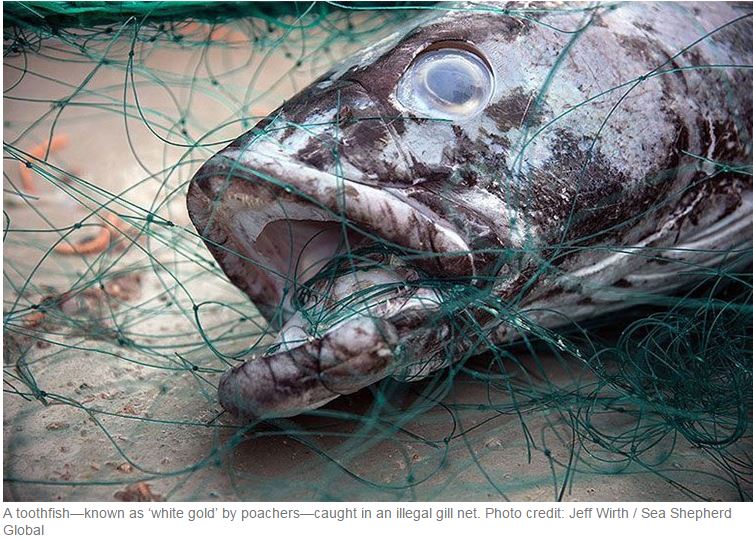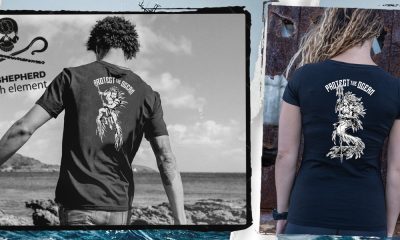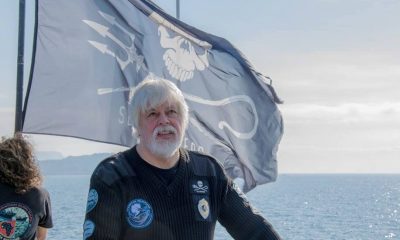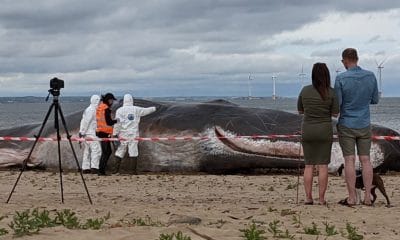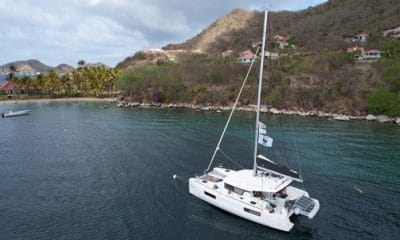News
Illegal Chilean Sea Bass Fishing Could Be Coming to an End, Thanks to Sea Shepherd
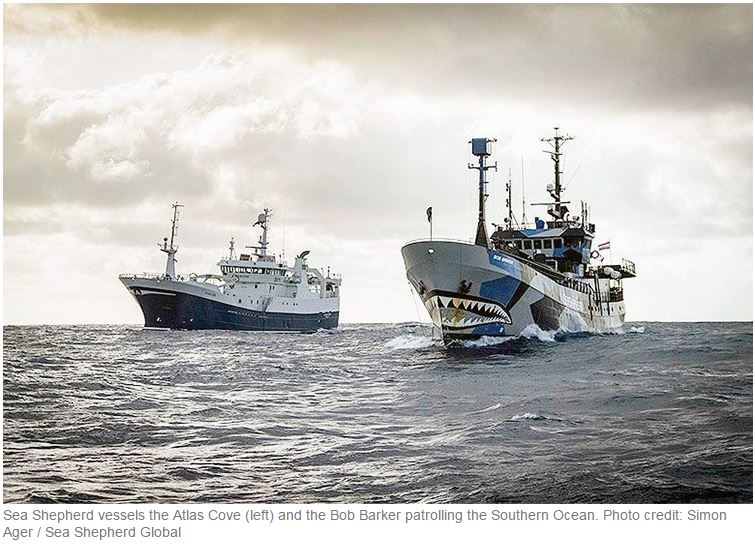
Sea Shepherd’s hunting of poaching vessels in the remote Southern Ocean is not as well known as its efforts to stop Japanese whale hunters, but for one species it’s a lifesaver.
The deep-sea-dwelling Patagonian toothfish that inhabits the region has been a lucrative target for illegal fishing. Six vessels, which Sea Shepherd has dubbed the Bandit 6, have been raking in big bucks skirting international fishing regulations. The ships are capable of catching more than $1 million worth of toothfish—popularly known as Chilean sea bass—before returning to port.
The boats have operated mostly unencumbered in the remote expanse of the Southern Ocean, often avoiding capture by flying under “flags of convenience” that hide the vessel’s ownership and make prosecution difficult. The Commission for the Conservation of Antarctic Marine Living Resources has put the ships on its blacklist.
“What made them stand out was their brazen return to Antarctica, year after year, in spite of being repeatedly spotted by customs vessels and other legal operators,” Sid Chakravarty, captain of the Sea Shepherd vessel Steve Irwin, said. “We realized that the vessels were deliberately exploiting the loopholes in international law and acting with a purpose, fully aware of the immunity they enjoyed.”
But thanks in part to Sea Shepherd’s two-year-long “Operation Icefish” campaign, only one vessel of the Bandit 6 is still in operation. Officials in Senegal on Tuesday detained the Kunlun, a toothfish-poaching vessel Sea Shepherd has been pursuing for more than a year.
In February 2015, Chakravarty, who was then captain of the Sea Shepherd’s vessel San Simon, chased the Kunlun for eight days out of Australian fishing waters. The boat was fishing with illegal gill nets that drag along the seabed, capturing and killing fish indiscriminately.
“It is incredibly satisfying to know that the Kunlun, which was chased out of the Southern Ocean by my vessel in February 2015, has been unable to resume its illegal fishing operations,” Chakravarty said. “The work done by Sea Shepherd completes and at times fills the gaps in the work of governments, which are restricted by outdated legal conventions.”
The capture of the Kunlun leaves the poaching vessel the Viking as the lone bandit on the high seas.
According to Sea Shepherd, the Viking is suspected to be fishing in Antarctica, once again using banned gill nets in the region. Chakravarty and the crew of the Steve Irwin are searching for the Viking.
“Once the vessel is located, the role of the [Sea Shepherd] is twofold,” Chakravarty said. “One, to afford immediate protection to marine wildlife by blockading the illegal operations of the Viking and two, to embark on a pursuit of the vessel and work with international law enforcement agencies to ensure the vessel is detained upon arrival in port. Using the evidence collected, Sea Shepherd’s aim is to aid and assist ongoing investigations with regards to the Viking.”
That plan worked in 2014, when Sea Shepherd Capt. Peter Hammarstedt and the crew aboard the 788-ton Bob Barker embarked on a 110-day, 10,000-nautical-mile ocean pursuit of the Nigerian-flagged boat Thunder, which was illegally fishing in the Southern Ocean.
The Thunder, considered the most notorious poaching vessel among the Bandit 6, ended up sinking at sea, with the crew and captain rescued by Sea Shepherd. In October 2015, the Thunder’s captain and two senior crew members were found guilty of multiple charges of illegal fishing, given 32 to 36 months of jail time and fined more than $17 million by a court in São Tomé and Príncipe—an island nation that lies off the west coast of Africa in the Gulf of Guinea.
“The aim of this mission is to locate [the Viking] and replicate the successes of the previous missions and to deliver a final blow to the illicit toothfish trade,” Chakravarty said.
Source: www.ecowatch.com
Gear News
Introducing the TR-80, IR-50 and CS-30 Regulators from DYNAMICNORD

Whether you are a beginner or a professional diver – with the three new main regulators from DYNAMICNORD, everyone will find their favourite regulator. They all look super stylish.
Excellent performance with the TR-80
Quality and performance are the be-all and end-all for regulators. It is not for nothing that the TR stands for Tec Reg. The innovative design of the TR-80 guarantees absolute reliability – even in ice-cold waters.

Perfect breathing effort at 0.8 J/l / certified for diving in waters below 10 degrees / structural design made of solid brass for best cold protection / membrane-compensated design with dry seal of the first stage / reduced exhalation effort thanks to optimized exhalation membrane and bubble deflector / adjustable Venturi (dive/predive) and adjustment knob for individual inhalation comfort / innovative design of the front cover prevents free-flow in strong currents or when diving with scooters / design made of sandblasted brass, matt chrome finish / 2 HP and 4 LP outlets / mouthpiece made of high-quality, anti-allergic silicone for maximum comfort.


Amazing underwater adventures with the IR-50
The IR-50 is the top regulator for advanced and experienced divers. Natural breathing is the essence of this regulator.

Ideal breathing effort at 0.8 J/l /certified for diving in waters below 10 degrees / compensated membrane / adjustable venturi (dive/predive) and adjustment knob for individual inhalation comfort/ outlet valve and deflector for minimum exhalation effort and reduction of bubbles on the face / design made of sandblasted brass, matt chrome finish / 2 HP and 4 NP outlets / mouthpiece made of high-quality, anti-allergic silicone for maximum comfort.


The Workhorse – our CS-30
For diving centres and diving beginners – the workhorse stands for strong construction, reliability and robustness. Perfect for your training.

Optimal breathing effort at 0.8 J/l /recommended for diving in waters above 10 degrees / non-compensated piston / adjustable venturi (dive/predive) / outlet valve and deflector for minimum exhalation effort and reduction of bubbles on the face / design made of sandblasted brass, matt chrome finish / 1 HP and 3 NP outlets / mouthpiece made of high-quality, anti-allergic silicone for maximum comfort.


Octopus OP-30
The OP-30 is the ideal addition to all DYNAMICNORD regulators. It is identical in construction to the CS-30.

The TR-80, IR-50, CS-30 (DIN & INT) regulators and the Octopus OP-30 are available from DYNAMICNORD dealers and in the online store.
DYNAMICNORD – Your Outdoor Companion.
Marine Life & Conservation
Paul Watson Released as Denmark Blocks Japan’s Extradition Bid

Renowned anti-whaling activist Paul Watson has been released from custody in Greenland after spending five months in detention. Denmark’s Justice Ministry rejected Japan’s request for his extradition, citing insufficient guarantees that his time already served in custody would be credited against any potential sentence.
The 74-year-old Canadian-American was arrested on July 21 in Nuuk, Greenland’s capital, when his ship docked to refuel. His arrest was based on a 2012 Japanese warrant related to a 2010 encounter in Antarctic waters. Japan alleged Watson obstructed operations and caused damage to a whaling research ship during efforts to disrupt illegal whaling. Watson has consistently denied these claims, maintaining his commitment to marine conservation.
Denmark, which oversees extradition matters for Greenland, concluded that while the legal conditions for extradition were met, the lack of assurances from Japan regarding time-served credit made extradition untenable.
In a video shared by his foundation, Watson expressed gratitude and relief, saying, “After five months, it’s good to be out… and good to know they’re not sending me to Japan.” He added that the most difficult part of his time in custody was being separated from his two young sons.
Watson is a pioneering figure in marine conservation, known for founding the Captain Paul Watson Foundation in 2022 after decades of activism with the Sea Shepherd Conservation Society. His bold efforts to defend marine life have earned him widespread support, including from celebrities and conservationists. His work has also been featured in the acclaimed reality TV series Whale Wars.
Watson’s lawyer, Jonas Christoffersen, praised the decision, stating, “We are happy and relieved that Paul Watson is now free.” He added that Watson is eager to reunite with his family and continue his vital work.
The arrest occurred while Watson’s vessel, the M/Y John Paul DeJoria, was en route to the North Pacific with a team of 26 volunteers to intercept a Japanese whaling ship. His foundation described the arrest as politically motivated and emphasized that Watson’s actions were focused on ending illegal whaling practices.
Japan resumed commercial whaling in 2019 after leaving the International Whaling Commission, asserting that whale meat is a cultural tradition. Conservationists, however, continue to challenge these practices, highlighting their impact on marine ecosystems.
Despite the challenges, Watson remains steadfast in his mission to protect marine life and bring attention to whaling practices. His dedication to ocean conservation has made him a globally respected advocate for the environment.
-

 News2 months ago
News2 months agoIconic SS United States to become the World’s Largest Artificial Reef
-

 News3 months ago
News3 months agoBook Review – 52 Assignments: Underwater Photography
-

 Gear News3 months ago
Gear News3 months agoDYNAMICNORD – New German diving brand enters the British market
-

 News3 months ago
News3 months agoExploring Cenote El Pit: A Diver’s Dream
-

 Gear News3 months ago
Gear News3 months agoTry BARE drysuits (and maybe even win one!) this Friday with Sea & Sea at North West Dive Fest
-

 Marine Life & Conservation3 months ago
Marine Life & Conservation3 months agoBook Review: Coral Triangle Cameos
-

 Blogs2 months ago
Blogs2 months agoDive the Egyptian Red Sea this Autumn with Regaldive
-

 News3 months ago
News3 months ago2024 Ocean Art Underwater Photo Competition Announced


